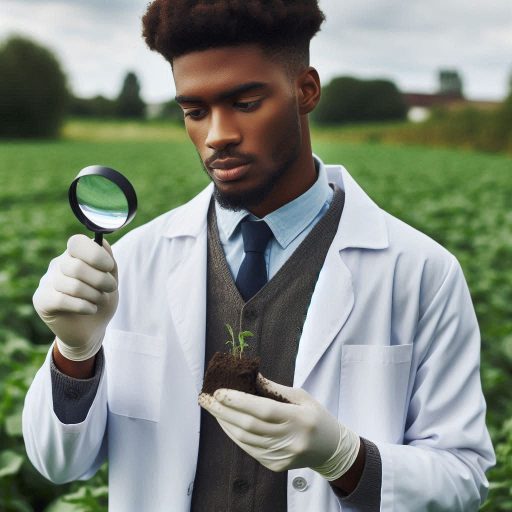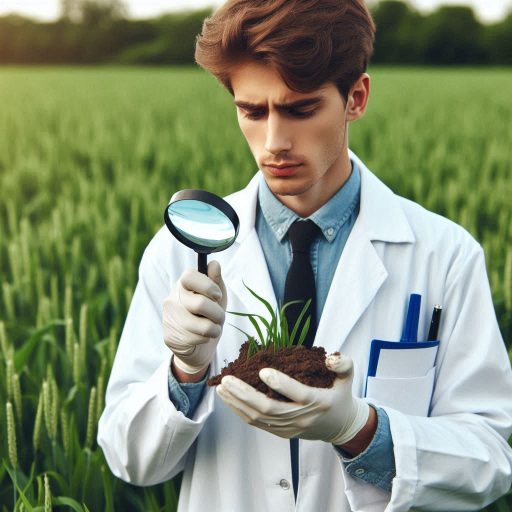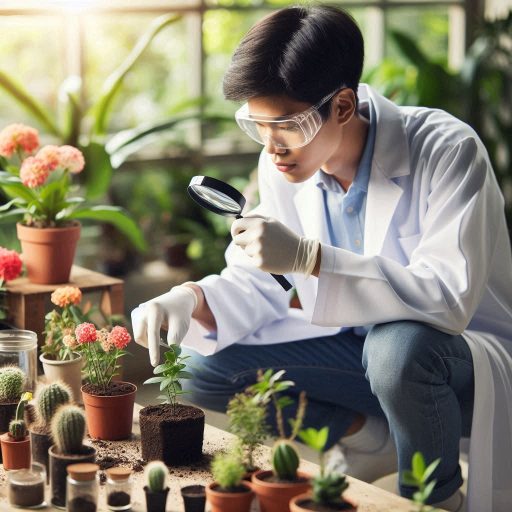Introduction
Soil science is the study of soil as a natural resource as soil science career educational pathways.
It focuses on soil formation, classification, and mapping.
Soil scientists analyze soil properties to understand its role in ecosystems and agriculture.
Their work is crucial for sustainable land management, environmental protection, and food security.
Various industries rely on soil science, including agriculture, construction, and environmental consulting.
In agriculture, soil scientists help improve crop yields through better soil management practices.
They advise on soil health, fertility, and conservation techniques.
The construction industry depends on soil scientists to assess site conditions.
Their expertise ensures the stability and safety of structures built on specific soils.
Environmental consulting firms employ soil scientists to evaluate soil contamination and remediation strategies.
As global challenges grow, so does the demand for soil science professionals.
Climate change, population growth, and urbanization create pressing needs for sustainable land use.
Soil scientists play a key role in developing strategies to address these challenges.
With increasing awareness of soil health’s importance, job opportunities in soil science continue to expand.
This growth offers promising career paths for aspiring soil scientists in various sectors.
Educational Requirements
The educational pathways to becoming a soil scientist
Becoming a soil scientist requires a solid educational foundation.
Individuals can follow various pathways to achieve this goal.
The most common route involves obtaining a bachelor’s degree in soil science or a related field.
This degree provides essential knowledge in soil biology, chemistry, physics, and ecology.
Understanding these subjects is crucial for analyzing soil properties and processes.
A bachelor‘s degree in soil science equips students with the skills to conduct fieldwork and laboratory analysis.
Many programs also offer hands-on experiences through internships and research projects.
These opportunities allow students to apply their knowledge in real-world situations.
Graduates can pursue entry-level positions in government agencies, environmental consulting firms, or agricultural organizations.
Importance of obtaining a bachelor’s degree in soil science or related field
While a bachelor’s degree is important, pursuing advanced degrees can enhance career prospects.
A master’s degree in soil science or a related field allows students to specialize further.
This degree often involves in-depth research, providing graduates with advanced technical skills.
Specialized knowledge makes candidates more competitive in the job market.
Benefits of pursuing advanced degrees such as a master’s or Ph.D. in soil science
A Ph.D. in soil science opens up even more opportunities.
It prepares individuals for careers in research, academia, and leadership positions.
Ph.D. holders often conduct groundbreaking research that influences soil management practices and policies.
They also teach the next generation of soil scientists, contributing to the field’s growth.
Advanced degrees also offer networking opportunities with professionals and experts.
Graduate programs often facilitate connections with industry leaders, enhancing job prospects upon graduation.
Additionally, pursuing further education allows for collaboration on innovative projects that push the boundaries of soil science.
The educational pathway to becoming a soil scientist is essential for success in the field.
A bachelor‘s degree provides a strong foundation, while advanced degrees open doors to specialized knowledge and leadership roles.
By pursuing these educational requirements, aspiring soil scientists can significantly impact soil health, environmental sustainability, and food security.
Investing in education is a vital step toward a successful and rewarding career in soil science.
Read: U.S. Cities with the Most Opportunities for Environmental Scientists
Hands-on Experience
Significance of gaining practical experience through internships or research opportunities
Gaining practical experience is crucial for aspiring soil scientists.
Internships and research opportunities provide valuable hands-on experience in the field.
These experiences enhance students’ understanding of soil science concepts and applications.
Internships often connect students with professionals, offering insights into the industry.
Participating in research projects helps develop critical thinking and problem-solving skills.
Students can apply theoretical knowledge to real-world situations through practical experiences.
This application reinforces learning and boosts confidence in their abilities.
Moreover, internships allow students to network with professionals, potentially leading to job opportunities.
Many employers prefer candidates with practical experience, making internships a vital part of career development.
Value of fieldwork in understanding soil composition and characteristics
Fieldwork is an essential component of soil science education.
It provides firsthand experience in soil sampling, analysis, and interpretation.
Through fieldwork, students learn to identify various soil types and their characteristics.
This understanding is crucial for assessing soil health and suitability for different uses.
Fieldwork also allows students to observe soil behavior in natural environments.
They can study factors influencing soil composition, such as climate and vegetation.
This observation helps students understand how to manage and conserve soil effectively.
Practical field experience builds a solid foundation for future work in soil science.
Information on relevant certifications or licenses that may be required for certain positions in soil science
Some soil science positions may require specific certifications or licenses.
These credentials demonstrate expertise and commitment to the profession.
For example, the Soil Science Society of America (SSSA) offers a certification program.
The Certified Professional Soil Scientist (CPSS) credential showcases proficiency in soil science.
Additionally, some states require licenses for soil scientists working on land development or environmental assessments.
These licenses ensure professionals adhere to local regulations and standards.
Obtaining relevant certifications enhances credibility and career prospects in the field.
Hands-on experience plays a vital role in soil science education.
Internships and research opportunities provide practical knowledge that enhances students‘ understanding.
Fieldwork allows for direct observation of soil characteristics and composition, reinforcing classroom learning.
Furthermore, pursuing relevant certifications and licenses strengthens professional credentials, opening doors to various job opportunities.
Aspiring soil scientists should prioritize gaining practical experience to succeed in their careers.
Read: Environmental Scientist vs. Ecologist: Roles and Differences in the US
Specialization Options
Various specializations within the field of soil science, such as soil conservation, soil chemistry, and soil microbiology
Soil science offers diverse specializations that cater to various interests.
Soil conservation focuses on protecting soil from erosion and degradation.
This specialization emphasizes sustainable practices that promote soil health and productivity.
Soil chemistry examines the chemical composition of soils and nutrient availability.
Professionals in this area analyze soil samples to inform agricultural practices.
They ensure crops receive the necessary nutrients for optimal growth.
Soil microbiology studies the microorganisms within soils and their impact on soil health.
This specialization is crucial for understanding nutrient cycling and organic matter decomposition.
Soil microbiologists play a vital role in sustainable agriculture by promoting beneficial microbial activity.
Other specializations include soil physics, which explores soil structure and water movement.
Soil fertility focuses on enhancing nutrient management to maximize crop yield.
Each specialization contributes to the broader understanding of soil systems and their functions.
Benefits of specializing in a specific area and how it can enhance career opportunities
Specializing in a specific area of soil science offers numerous benefits.
First, it allows professionals to develop in-depth knowledge and expertise.
This expertise can make them more competitive in the job market.
Employers often seek candidates with specialized skills that align with their needs.
Specializing enables individuals to focus on areas of interest and passion.
This focus can lead to greater job satisfaction and fulfillment.
Additionally, specialization opens up various career pathways.
For instance, soil conservation specialists may work with government agencies, NGOs, or consulting firms.
Soil chemists might find roles in laboratories, agriculture, or environmental consulting.
Moreover, specialization can lead to leadership opportunities within organizations.
Experts in a specific field often take on roles in project management or research leadership.
They may also contribute to policy development related to soil management.
Networking within specialized fields can also enhance career opportunities.
Attending conferences, workshops, and seminars allows professionals to connect with others in their area.
These connections can lead to collaborations, mentorships, and job opportunities.
The field of soil science offers various specializations, each with unique contributions.
Soil conservation, soil chemistry, and soil microbiology are just a few examples.
Specializing in a specific area can enhance career opportunities and job satisfaction.
Professionals who pursue specialized knowledge will find themselves better positioned for success in their careers.
Read: The Relationship Between U.S. Policy & Environmental Scientist Roles

Networking and Professional Development
Importance of networking with professionals in the field of soil science
Networking plays a vital role in advancing a career in soil science.
Building connections with professionals can open doors to new opportunities.
Engaging with peers and experts allows individuals to share knowledge and insights.
Networking helps soil scientists stay informed about industry trends and best practices.
It fosters collaborations that can enhance research projects and career growth.
Additionally, these connections may lead to job referrals and mentorship opportunities.
Participating in discussions within the field can enrich one’s understanding of current challenges.
Networking also provides a platform for exchanging innovative ideas and solutions.
Tips on attending conferences, workshops, and seminars to stay updated on industry trends
Attending conferences, workshops, and seminars is essential for professional development.
These events offer valuable opportunities to learn from leading experts in soil science.
To make the most of these events, set specific goals for what you want to achieve.
Research the agenda and identify sessions that align with your interests.
Engage actively during sessions by asking questions and participating in discussions.
Networking breaks are ideal for connecting with fellow attendees and speakers.
Consider volunteering at conferences to gain behind-the-scenes experience.
This involvement can lead to additional networking opportunities and insights into the industry.
After attending events, follow up with new contacts to maintain connections.
Use social media platforms like LinkedIn to connect and share insights.
The benefits of joining professional organizations related to soil science
Joining professional organizations offers numerous advantages for soil scientists.
These organizations provide access to valuable resources and networking opportunities.
Membership often includes subscriptions to industry journals and newsletters.
This access keeps members informed about the latest research and developments.
Professional organizations frequently host conferences, workshops, and training sessions.
These events facilitate networking and knowledge sharing among members.
Members can also access job boards and career resources tailored to soil science.
This support can help individuals find job openings and career advancement opportunities.
Moreover, joining a professional organization enhances credibility within the field.
Membership demonstrates a commitment to professional growth and ethical practices.
Engaging in leadership roles within these organizations can further enhance visibility.
Participating in committees or organizing events showcases expertise and dedication.
Networking and professional development are crucial for success in soil science.
Building connections with professionals enriches knowledge and opens opportunities.
Attending conferences and joining professional organizations can further enhance career growth.
By actively participating in these activities, soil scientists can thrive in their careers and contribute to the field’s advancement.
Read: Organizations & Associations for Environmental Scientists in the USA
Gain More Insights: Pros and Cons of Freelancing as a Data Scientist
Job Opportunities and Growth
Diverse range of career opportunities available to soil scientists in fields
Soil scientists enjoy a diverse range of career opportunities across multiple fields.
In agriculture, they work to enhance crop production and soil management practices.
These professionals develop strategies to optimize soil health and fertility for sustainable farming.
In environmental science, soil scientists assess soil quality and its impact on ecosystems.
They help mitigate soil contamination and develop remediation plans.
Their expertise is crucial for protecting natural resources and promoting environmental sustainability.
Soil scientists also find opportunities in geology, where they study soil formation and mineral composition.
They analyze soil properties to inform land-use planning and geological assessments.
Government agencies hire soil scientists to create policies related to land management and conservation.
These professionals contribute to regulatory frameworks that protect soil resources.
Additionally, soil scientists work in research and academia.
They conduct studies that advance knowledge in soil science and educate future professionals.
Consulting firms often seek soil scientists to provide expertise on soil-related projects.
These consultants help clients navigate complex soil issues and recommend best practices.
Projected job growth in the field of soil science and potential salary ranges for professionals
The job outlook for soil scientists remains positive, with projected growth in various sectors.
According to the Bureau of Labor Statistics, employment for soil and plant scientists is expected to grow by 7% by 2030.
This growth is driven by increasing awareness of sustainable agriculture and environmental conservation.
As society prioritizes food security and ecosystem health, soil scientists will play a vital role.
The demand for soil scientists is particularly strong in agriculture and environmental management.
As farmers adopt sustainable practices, they will seek expert guidance on soil health.
Potential salary ranges for soil scientists vary based on experience and education.
Entry-level positions typically start around $50,000 to $60,000 annually.
With advanced degrees and experience, soil scientists can earn between $70,000 and $90,000.
Senior positions, especially in research or management, may offer salaries exceeding $100,000.
Overall, the field of soil science presents numerous career opportunities and a promising job outlook.
Soil scientists contribute to critical issues related to agriculture, the environment, and sustainability.
Their expertise is essential for addressing global challenges, such as climate change and food security.
As a result, pursuing a career in soil science offers both professional fulfillment and financial stability.
See Related Content: How to Write a Winning Archaeology Research Proposal
Transform Your Career Today
Unlock a personalized career strategy that drives real results. Get tailored advice and a roadmap designed just for you.
Start NowConclusion
In this blog post, we explored the educational pathways to a career in soil science.
First, we discussed the importance of obtaining a bachelor’s degree in soil science or a related field.
This foundational education equips students with essential knowledge and skills.
Next, we highlighted the benefits of pursuing advanced degrees, such as a master’s or Ph.D.
These degrees open doors to specialized career opportunities and research roles.
We emphasized the significance of hands-on experience through internships and fieldwork.
Practical experience helps aspiring soil scientists understand soil composition and characteristics better.
Additionally, we discussed various specialization options within soil science, such as soil conservation and soil microbiology.
Specializing enhances career prospects and allows professionals to focus on their interests.
Networking and professional development play crucial roles in building a successful career.
Attending conferences and joining professional organizations can keep you updated on industry trends.
Finally, we examined the diverse job opportunities and growth potential in soil science.
The field offers promising career prospects in agriculture, environmental science, and geology.
We encourage readers to consider pursuing a career in soil science.
This profession is not only rewarding but also vital for addressing global challenges.




